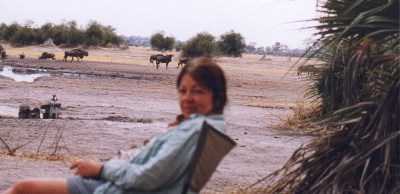|






Visit
my Photo Galleries
| |
If you go to Africa...
First of all, get familiarized with the
country or countries you will visit, and with any health precautious you might
need to take. Your local Department of Health usually has all the
information and recommendations.
Make sure you deal with a reputable travel
agent or, if going on your own, that you have good maps and plan well. In
Africa you could drive for hours without seeing a village or a human being; be
prepared. Driving at night could be very treacherous in most places, and
camping sometimes is allowed only at designated camp sites.
Whatever you do, wherever you go, please:
 |
Do not litter |
 |
Do not take any
"souvenirs" from a natural environment... NOTHING. Believe
it or not, everything gets recycled in Nature. |
 |
Do not buy any souvenirs
made of endangered species (animal, vegetal or mineral) |
If you want to take something home, you can
buy beautiful and inexpensive souvenirs just about everywhere.
Hmmm,
let's see, what to take to Africa?
Well, considering that I'm usually camping, I
might be exaggerating a bit, but I'd rather tell you more than less of what you
might need. Here is what I think you should take (or know):
 | A hat, sunglasses and sun lotion - very
important |
 | Bandanas - very useful: to clean something,
to wear on your head when it's dusty, etc. etc. I usually take about 3 of
those and use them all. |
 | Flashlight and extra batteries - you never know
when you'll need it, especially if you go to a dark toilet and don't want to
interfere with spiders bathing in the toilet bowl. (!) |
 | Travel alarm clock. Mine is my wrist watch (a
Timex) |
 | Long-sleeved cotton shirts and pants. They
keep you cool in hot days and protect you from bugs. They are also
useful if you are going to walk in the countryside or the bush, like a
comfortable pair of hiking boots. Don't wear army
camouflage clothing. |
 | Depending on where you are going, take water
purifying tablets and a plastic water bottle. I usually take also an
empty bottle of Poland Spring or whatever. Very useful. While most times
I've been able to buy bottled water, the one time I couldn't my water bottle
was a blessing. Even in Namibia, where water is potable just about
everywhere, I always had water with me as I kept refilling my bottle over
and over. |
 | Basic over-the-counter medication for colds,
stomach problems, band-aids and blister pads, fungicide powder, etc.
For ladies, take feminine pads or tampons if you think you might need them.
If you end up not using any of this, you can always leave it behind;
people there always appreciate it. |
 | Take only biodegradable products. Most
shampoos, soaps, skin lotions, etc. are available in environment-friendly
formulas. |
 | For the shower, I actually take a pair of plastic
flip-flops which I usually wear in any public shower. |
 | Bug repellent. No need to explain. |
 | Inexpensive souvenirs or gifts. Kids like
crayons, or pens, little notebooks... that kind of stuff. I avoid giving
candy, I think it creates bad habits. Also take souvenirs for people you'll
come in contact with, ESPECIALLY if you get invited to their home. Most
Africans are very detail-oriented that way. |
 | Money/document belt to keep money, passport,
credit cards, etc. |
 | Make sure you have medical coverage. It is easy
and inexpensive to buy a policy. I usually buy travelers' medical
insurance in case I have to be evacuated on helicopter or something, God
forbid. |
 | Light raincoat or windbreaker. Check the
weather. |
 | I usually take those "camping" towel,
very light and absorbent. You can find them at outdoor supplies stores like
EMS. |
 | Avoid wearing jewelry, it's ostentatious,
useless and like anywhere in the world, could attract people with bad
intentions. Besides, losing an earring in the bush is not fun. |
 | Carry with you a card with important phone numbers
and an emergency contact number. Also find the address and phone number
of the U.S. Embassy and keep it with your list. |
 | Field guides are great if you are interested in
identifying what you see. I bought several while already in Africa
(mammals and birds of Southern Africa). They were useful there, and
back home to remember what I photographed! |
 | Camera and/or video camera of course, and binoculars
(at least 12x25). There is so much beauty in Africa that you don't
want to miss a thing. Take lots of film and/or video tapes
because sometimes they are hard to find or too expensive. If you're into
photography, a 300mm. zoom lens is enough to photograph large animals; for
birds you need a more powerful lens. For video cameras, take
solar-powered batteries if you can. It is not always easy to find a
place to recharge batteries. |
And most importantly:
Pay attention to
local customs.
If you want to take photos of people,
always ask them if it is OK.
Watch what the locals do, e.g., if they
shake hands or not, how they sit or eat. In some cultures, for example,
using the left hand to eat or greet is considered impolite.
In most cultures the older or the highest
ranking person greets first. I don't know if this is true for every African
country but you can pay attention or ask.
Be humble. Even if you happen to be
from a more developed country, show interest in and respect local
cultures. You might learn a lot.
Learn a word or two in the local language(s).
"Thank you" and "Hello" usually work for me.
And finally, try the local food! If
you don't get to like it, at least you can talk about it!
|
